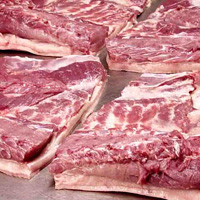Chicago's last major slaughterhouse looking for a new home
More than 100 years after Upton Sinclair's scathing critique of Chicago's meat industry in "The Jungle," the city's last major slaughterhouse is looking for a new home.

Franco Chiappetti, among the fourth generation of Chiappettis to run Chiappetti Veal and Lamb, said the company is pressed by a lack of space - and increasingly surrounded by expensive homes, shops and restaurants rapidly transforming the once-gritty enclave.
"I'm looking out the window at the rooftop of a $500,000 (EUR 375,235, three-year-old home," Chiappetti said. "We didn't pick a residential area, a residential area picked us."
When the slaughterhouse moves, the old brick buildings likely will be torn down to make way for houses, book stores, restaurants and other businesses, said Franco Chiappetti's father, company President Dennis Chiappetti.
And with that, the neighborhood could lose one of the last reminders of an industry that once was the envy of the world, and a symbol of American ingenuity.
Opened in 1865, the Chicago Union Stockyards were the center of a small city of slaughterhouses and packing houses that was the largest meatpacking district in the world, the AP says.
Railroads brought in millions of cattle, sheep and pigs and the animals then were shipped - alive or after being slaughtered - all over the nation.
Between 1893 and 1933, at least 13 million animals were shipped into and out of Chicago every year, said Dominic Pacyga, a history professor at Columbia College in Chicago.
Visitors from around the world came to see the action. During the 1893 World's Columbian Exposition, thousands of people watched in amazement as animals were killed and cut up by as many as 120 workers along a so-called "disassembly line," a process that reduced to minutes what took lone butchers several hours.
One visitor was Henry Ford. As the story goes, Ford was so impressed by what he saw that he used it as the model for his automobile assembly line.
"It was the biggest tourist attraction in the city," said Donald Miller, a historian at Lafayette College in Easton, Pennsylvania, who wrote City of the Century: The Epic of Chicago and the Making of America."
Into the sprawling meatpacking district stepped Italian immigrant Fiore Chiappetti. A railroad worker, he killed a lamb for himself one day, said his grandson, Dennis Chiappetti. "Another guy said, 'Can you do the same for me,' and another guy said the same thing," he said.
That led Chiappetti to go into businesses in the 1920s. The company bought the buildings that comprise its current home in the 1940s and 60s.
But between the rapid expansion of the interstate highway system after World War II and refrigerated trucks, it was no longer necessary for the industry to be next to railroad tracks. And rural areas out West, closer to where cattle were raised, offered cheaper land and labor.
The stockyards closed in 1971, prompting meatpackers big and small to leave. But Chiappetti stayed, and more than three decades later, the 130-employee business slaughters about 3,000 lambs and 400 veal calves a week.
"The big guys used to refer to the smaller guys as alley rats," said Franco Chiappetti. "It's funny that we stand as the only rat in the city."
Chris McCormick, who grew up in the area and now lives in a new home across the street from Chiappetti, said he's a little sad that his own young children won't experience the "zoo in the city" that he enjoyed as a boy.
"I remember my father taking me and my sister to see cows in stables off Halsted Street," McCormick said.
The Chiappettis said they expect to find a new home somewhere in Chicago - perhaps even in an industrial park on part of the old stockyards, and the process could take a year. But wherever they move, it will be out of view - and smell - of homes and businesses, Dennis Chiappetti said.
City officials said they want to keep the company somewhere in Chicago.
"We certainly want to keep that element of Chicago's past alive in the city," said Constance Buscemi, spokeswoman for Chicago's planning department.
McCormick said there is one thing he won't miss.
"My daughter sees their trucks and asks, 'Why is there a truck full of lambs?"' he said. "That is a conversation I won't miss."
Subscribe to Pravda.Ru Telegram channel, Facebook, RSS!


